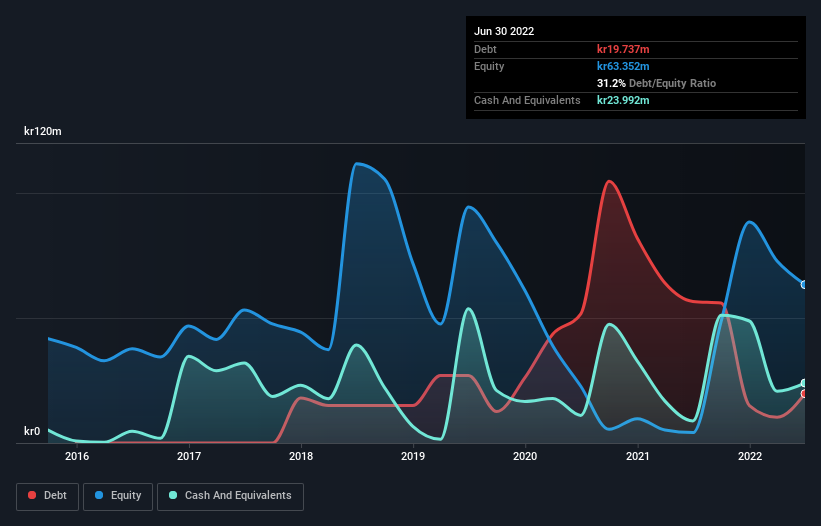
Howard Marks put it nicely when he said that, rather than worrying about share price volatility, 'The possibility of permanent loss is the risk I worry about... and every practical investor I know worries about.' When we think about how risky a company is, we always like to look at its use of debt, since debt overload can lead to ruin. We can see that Cortus Energy AB (publ) (STO:CE) does use debt in its business. But is this debt a concern to shareholders?
When Is Debt Dangerous?
Debt assists a business until the business has trouble paying it off, either with new capital or with free cash flow. If things get really bad, the lenders can take control of the business. However, a more frequent (but still costly) occurrence is where a company must issue shares at bargain-basement prices, permanently diluting shareholders, just to shore up its balance sheet. Of course, debt can be an important tool in businesses, particularly capital heavy businesses. When we examine debt levels, we first consider both cash and debt levels, together.
View our latest analysis for Cortus Energy
What Is Cortus Energy's Debt?
The image below, which you can click on for greater detail, shows that Cortus Energy had debt of kr19.7m at the end of June 2022, a reduction from kr56.6m over a year. But on the other hand it also has kr24.0m in cash, leading to a kr4.26m net cash position.

A Look At Cortus Energy's Liabilities
According to the last reported balance sheet, Cortus Energy had liabilities of kr39.0m due within 12 months, and liabilities of kr8.22m due beyond 12 months. On the other hand, it had cash of kr24.0m and kr4.65m worth of receivables due within a year. So it has liabilities totalling kr18.6m more than its cash and near-term receivables, combined.
Of course, Cortus Energy has a market capitalization of kr565.4m, so these liabilities are probably manageable. Having said that, it's clear that we should continue to monitor its balance sheet, lest it change for the worse. While it does have liabilities worth noting, Cortus Energy also has more cash than debt, so we're pretty confident it can manage its debt safely. There's no doubt that we learn most about debt from the balance sheet. But it is Cortus Energy's earnings that will influence how the balance sheet holds up in the future. So when considering debt, it's definitely worth looking at the earnings trend. Click here for an interactive snapshot.
In the last year Cortus Energy wasn't profitable at an EBIT level, but managed to grow its revenue by 1,062%, to kr2.5m. That's virtually the hole-in-one of revenue growth!
So How Risky Is Cortus Energy?
Statistically speaking companies that lose money are riskier than those that make money. And the fact is that over the last twelve months Cortus Energy lost money at the earnings before interest and tax (EBIT) line. And over the same period it saw negative free cash outflow of kr55m and booked a kr68m accounting loss. With only kr4.26m on the balance sheet, it would appear that its going to need to raise capital again soon. Importantly, Cortus Energy's revenue growth is hot to trot. While unprofitable companies can be risky, they can also grow hard and fast in those pre-profit years. When analysing debt levels, the balance sheet is the obvious place to start. However, not all investment risk resides within the balance sheet - far from it. These risks can be hard to spot. Every company has them, and we've spotted 6 warning signs for Cortus Energy (of which 4 are potentially serious!) you should know about.
If, after all that, you're more interested in a fast growing company with a rock-solid balance sheet, then check out our list of net cash growth stocks without delay.
If you're looking to trade Cortus Energy, open an account with the lowest-cost platform trusted by professionals, Interactive Brokers.
With clients in over 200 countries and territories, and access to 160 markets, IBKR lets you trade stocks, options, futures, forex, bonds and funds from a single integrated account.
Enjoy no hidden fees, no account minimums, and FX conversion rates as low as 0.03%, far better than what most brokers offer.
Sponsored ContentNew: AI Stock Screener & Alerts
Our new AI Stock Screener scans the market every day to uncover opportunities.
• Dividend Powerhouses (3%+ Yield)
• Undervalued Small Caps with Insider Buying
• High growth Tech and AI Companies
Or build your own from over 50 metrics.
Have feedback on this article? Concerned about the content? Get in touch with us directly. Alternatively, email editorial-team (at) simplywallst.com.
This article by Simply Wall St is general in nature. We provide commentary based on historical data and analyst forecasts only using an unbiased methodology and our articles are not intended to be financial advice. It does not constitute a recommendation to buy or sell any stock, and does not take account of your objectives, or your financial situation. We aim to bring you long-term focused analysis driven by fundamental data. Note that our analysis may not factor in the latest price-sensitive company announcements or qualitative material. Simply Wall St has no position in any stocks mentioned.
About OM:CE
Medium-low and overvalued.
Market Insights
Community Narratives



